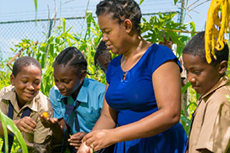Mitigating the effects of climate change in the Caribbean
In the Caribbean, climate change has already had a negative impact on agriculture, fisheries, health, tourism, water availability and energy—and women and girls and other vulnerable groups suffer the most. Canada’s Enabling Gender-Responsive Disaster Recovery, Climate and Environmental Resilience in the Caribbean (EnGenDER) project is helping to address these impacts.
The project is supporting gender-based climate resilience analyses in several Caribbean countries. By dissecting the gender-based needs and capacities of highly vulnerable groups, the aim is to ensure targeted actions are taken to improve the region’s climate adaptation and resilience.

© Talk Up Yout Media, UNDP Jamaica
One of the main recommendations coming out of the analyses is the need for key sectors to invest in gender-responsive adaptation strategies, action plans and policies. For instance, St. Lucia has already developed a project proposal to support marginalized groups within the agriculture sector—such as women and youth farmers, and farmers with disabilities—by developing and using aquaponics. Through EnGenDER, Jamaica is working toward making sure that their transportation, housing and climate change policies take gender into account.
“This is necessary to ensure that we work steadily and seamlessly toward achieving the gender-responsive outcomes which we seek, as we strategically navigate the inter-linkages between gender and climate change,” explains Sharon Coburn Robinson of Jamaica’s Bureau of Gender Affairs.
- Date Modified: